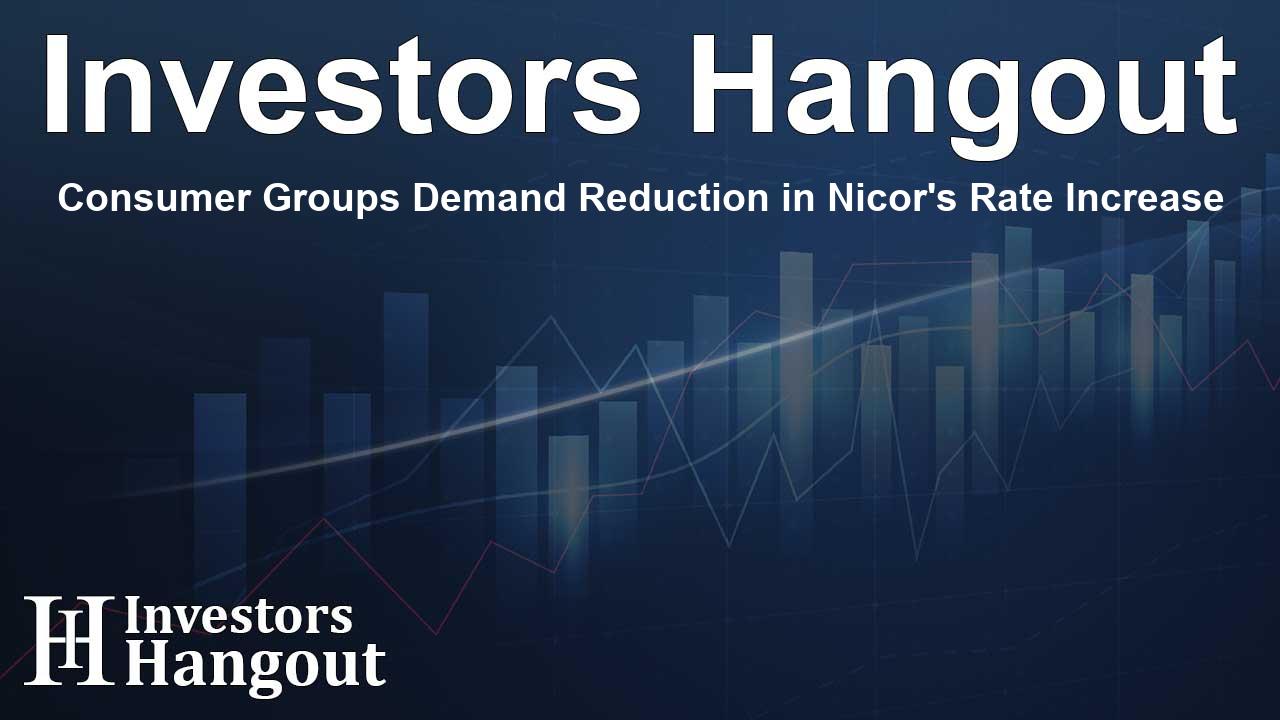Consumer Groups Demand Reduction in Nicor's Rate Increase

Consumer Advocates Push Back Against Nicor's Proposed Rate Hike
Consumer advocacy groups are rallying together to challenge Nicor Gas's overwhelming proposal for a record-breaking rate hike that could leave customers with substantially higher bills. Their united stance calls for a significant reduction in Nicor's requested increase of approximately $308.6 million, arguing that this amount should be cut by more than half to ensure fairness and balance for consumers.
Concerns Over Excessive Profits
Advocates, including the Citizens Utility Board (CUB) and Illinois PIRG, have brought forth compelling testimony highlighting the excessive profits Nicor Gas aims to secure through this rate increase. They contend that over $111 million of the proposed hike stems from unjustified profit margins meant for shareholders, alongside extravagant executive bonuses. The Illinois Attorney General has echoed these concerns, suggesting that further cuts of nearly $153 million are warranted based on their findings.
History of Rate Increases
This proposal marks Nicor's fifth attempt at raising rates since 2017, during which the utility has increased its delivery rates drastically—114 percent including a staggering $747 million in total increases. The parent company, Southern Co., has reported substantial profits during this time, amounting to $25.2 billion. Such statistics raise questions about the sustainability of Nicor's practices, intensifying calls for reform and accountability.
Calls for Change in Utility Practices
Advocates are urging Nicor to pivot from their longstanding practices of excessive rate adjustments. Abe Scarr, the Director of Illinois PIRG, emphasizes the importance of considering alternatives to expanded fossil fuel infrastructure that could effectively reduce customer rate increases while promoting the transition to cleaner, safer energy sources.
Shifting Towards Cleaner Energy
As part of ongoing efforts, the Environmental Defense Fund (EDF) has reported on Nicor's sluggish response to the state's decarbonization mandates. They have presented suggestions regarding alternative approaches that can be adopted without significantly impacting the quality of service provided to consumers.
Financial Analysis and Recommendations
Analysis conducted by experts from CUB and partners has led to critical recommendations, including reducing planned gas-pipeline expenditures by more than $80 million. These recommendations arose from concerns that Nicor has inadequately explored non-pipeline alternatives, such as targeted electrification or repair methods.
Proposed Amendments to the Rate Structure
CUB proposes that the requested return on equity, currently posed at a hefty 10.35 percent, should align closer to a more reasonable rate of 9.45 percent. This adjustment could lower the proposed rate increase by over $47 million. Additionally, plans to increase the common equity ratio, allowing more funding through stock issuance, have been criticized as exorbitant. Maintaining the current ratio of 50 percent instead of raising it to 54.59 percent could provide further substantial relief to customers.
Take Action for a Fair Outcome
Consumer advocates are also calling for the elimination of executive bonuses tied to financial objectives that do not benefit customers directly. This stance, combined with various other financial adjustments flagged by CUB, could lead to an overall reduction exceeding $111.5 million in the proposed rate hike. A thorough examination of costs attributed to gas sales forecasts and working capital management could reveal even more savings that align better with customer interests.
Engaging Consumers in the Process
The Commission is anticipated to finalize its decisions regarding Nicor's rate request in upcoming months, indicating a critical period for consumer engagement. Consumer advocates are encouraging customers to participate actively in this process to ensure their voices are heard and considered by the Illinois Commerce Commission.
Frequently Asked Questions
What is Nicor Gas trying to achieve with this rate hike?
Nicor Gas is seeking to implement a significant rate hike that they claim is essential to cover rising operational costs and secure returns for shareholders.
Why are consumer advocates against the rate hike?
Consumer advocates argue that the hike is excessive and primarily benefits shareholders, while burdening customers with unnecessary costs.
How has Nicor's rate history impacted consumers?
Nicor's history of numerous rate increases has resulted in substantial delivery rate hikes, exceeding 100% since 2017, causing financial strain for customers.
What steps are being recommended to reduce the proposed rate hike?
Recommendations include lowering return on equity, maintaining a balanced capital structure, and eliminating unnecessary executive bonuses that do not benefit consumers.
When can consumers expect a decision regarding the rate hike?
The Illinois Commerce Commission is expected to make a ruling on Nicor's proposed rate hike after a thorough review process that spans several months.
About The Author
Contact Riley Hayes privately here. Or send an email with ATTN: Riley Hayes as the subject to contact@investorshangout.com.
About Investors Hangout
Investors Hangout is a leading online stock forum for financial discussion and learning, offering a wide range of free tools and resources. It draws in traders of all levels, who exchange market knowledge, investigate trading tactics, and keep an eye on industry developments in real time. Featuring financial articles, stock message boards, quotes, charts, company profiles, and live news updates. Through cooperative learning and a wealth of informational resources, it helps users from novices creating their first portfolios to experts honing their techniques. Join Investors Hangout today: https://investorshangout.com/
The content of this article is based on factual, publicly available information and does not represent legal, financial, or investment advice. Investors Hangout does not offer financial advice, and the author is not a licensed financial advisor. Consult a qualified advisor before making any financial or investment decisions based on this article. This article should not be considered advice to purchase, sell, or hold any securities or other investments. If any of the material provided here is inaccurate, please contact us for corrections.
